BUS703 Research Proposal: Innovation in Singapore Consulting
VerifiedAdded on 2022/11/26
|13
|2742
|378
Report
AI Summary
This research proposal investigates the challenges and opportunities related to fostering innovation within a Singaporean management consulting company. The study aims to analyze the current innovation practices, identify gaps in existing strategies, and recommend new methods to align with emerging market trends. The research addresses the company's difficulties in implementing innovative initiatives, particularly concerning staff perceptions of these strategies. The proposal outlines the research objectives, questions, and methodology, including a positivism approach, qualitative data collection through interviews and secondary sources, and thematic data analysis. It also considers ethical considerations and limitations. The literature review explores the trends and challenges in the management consulting industry, emphasizing the need for innovation to maintain competitiveness and address the challenges posed by evolving client expectations and market dynamics. The study seeks to provide actionable recommendations to enhance productivity and maintain the company's profitability and reputation.
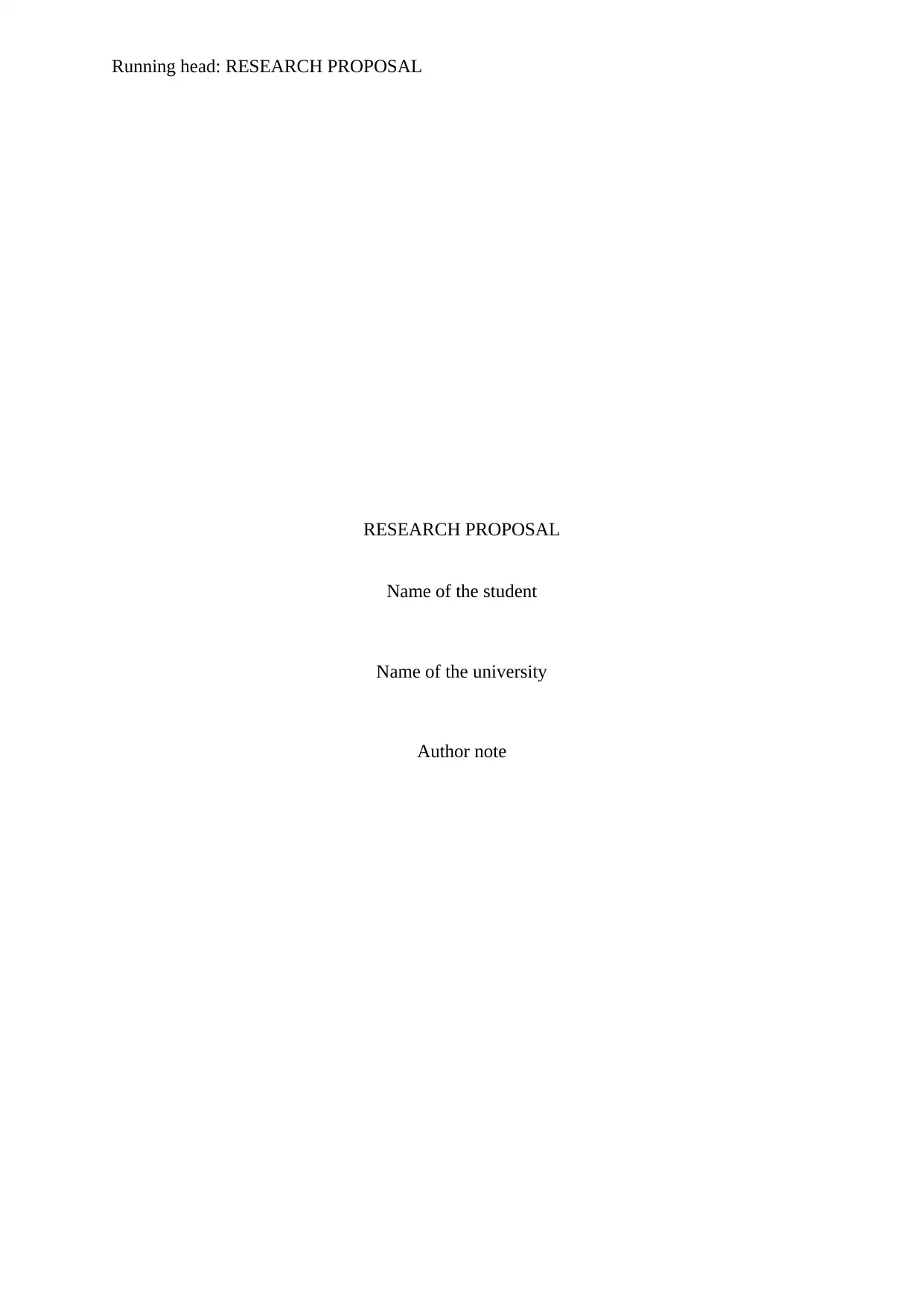
Running head: RESEARCH PROPOSAL
RESEARCH PROPOSAL
Name of the student
Name of the university
Author note
RESEARCH PROPOSAL
Name of the student
Name of the university
Author note
Paraphrase This Document
Need a fresh take? Get an instant paraphrase of this document with our AI Paraphraser

1RESEARCH PROPOSAL
Table of Contents
1.1Introduction...........................................................................................................................2
1.2Background of the study.......................................................................................................2
1.3 Problem statement................................................................................................................3
1.4 Research aims and objectives...............................................................................................3
1.5 Research question.................................................................................................................4
1.6 Literature review..................................................................................................................4
2.1 Trends and challenges of the management consulting industry.......................................4
2.2 Challenges of the management of the consulting industries............................................6
1.7 Research methodology........................................................................................................7
3.1 Research design................................................................................................................7
3.2 Data collection method....................................................................................................7
3.3 Conceptualisation and measurement................................................................................7
3.4 Data analysis method.......................................................................................................7
3.5 Research ethical consideration.........................................................................................8
3.6 Limitations of the study...................................................................................................8
Reference..................................................................................................................................11
Table of Contents
1.1Introduction...........................................................................................................................2
1.2Background of the study.......................................................................................................2
1.3 Problem statement................................................................................................................3
1.4 Research aims and objectives...............................................................................................3
1.5 Research question.................................................................................................................4
1.6 Literature review..................................................................................................................4
2.1 Trends and challenges of the management consulting industry.......................................4
2.2 Challenges of the management of the consulting industries............................................6
1.7 Research methodology........................................................................................................7
3.1 Research design................................................................................................................7
3.2 Data collection method....................................................................................................7
3.3 Conceptualisation and measurement................................................................................7
3.4 Data analysis method.......................................................................................................7
3.5 Research ethical consideration.........................................................................................8
3.6 Limitations of the study...................................................................................................8
Reference..................................................................................................................................11
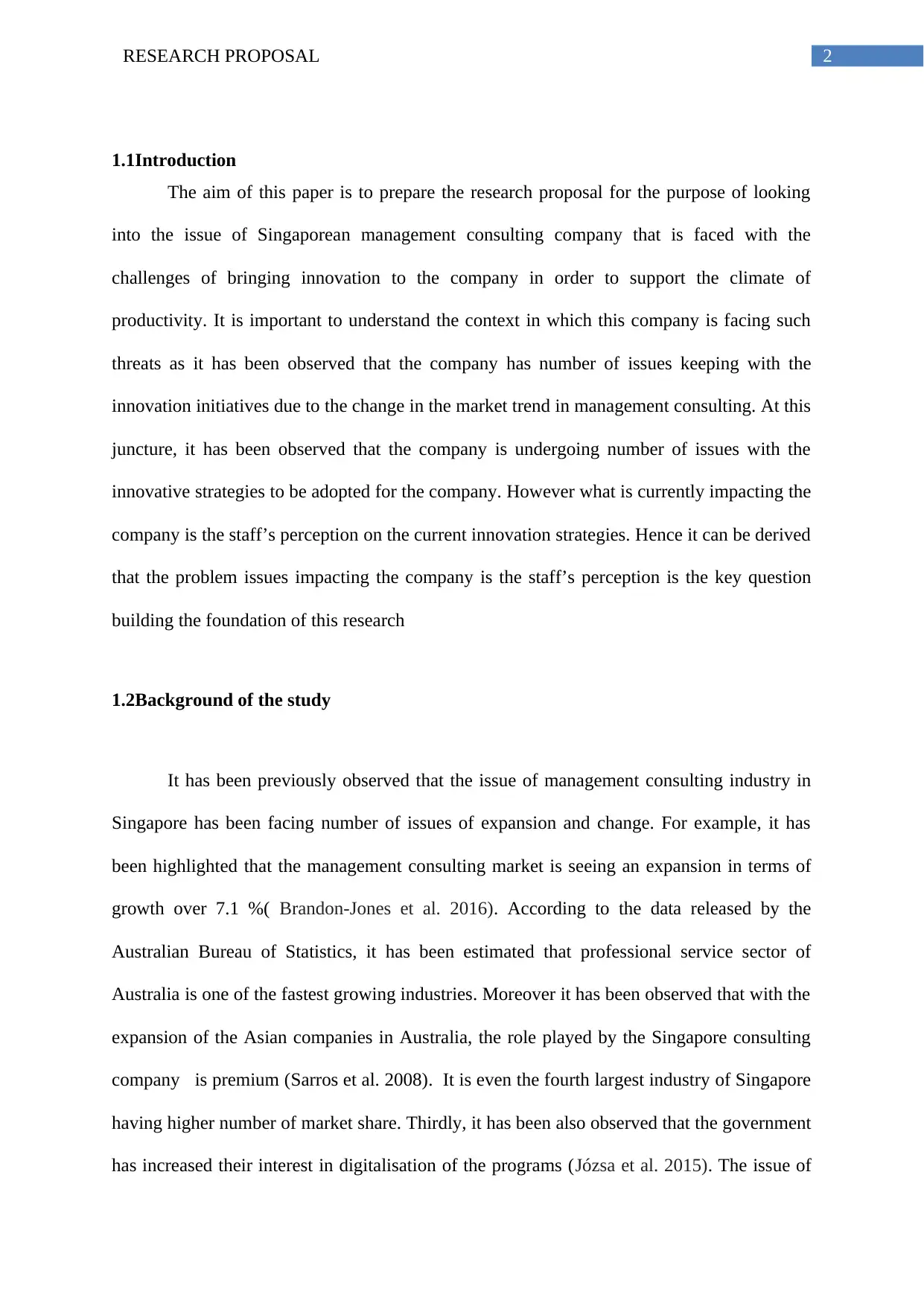
2RESEARCH PROPOSAL
1.1Introduction
The aim of this paper is to prepare the research proposal for the purpose of looking
into the issue of Singaporean management consulting company that is faced with the
challenges of bringing innovation to the company in order to support the climate of
productivity. It is important to understand the context in which this company is facing such
threats as it has been observed that the company has number of issues keeping with the
innovation initiatives due to the change in the market trend in management consulting. At this
juncture, it has been observed that the company is undergoing number of issues with the
innovative strategies to be adopted for the company. However what is currently impacting the
company is the staff’s perception on the current innovation strategies. Hence it can be derived
that the problem issues impacting the company is the staff’s perception is the key question
building the foundation of this research
1.2Background of the study
It has been previously observed that the issue of management consulting industry in
Singapore has been facing number of issues of expansion and change. For example, it has
been highlighted that the management consulting market is seeing an expansion in terms of
growth over 7.1 %( Brandon-Jones et al. 2016). According to the data released by the
Australian Bureau of Statistics, it has been estimated that professional service sector of
Australia is one of the fastest growing industries. Moreover it has been observed that with the
expansion of the Asian companies in Australia, the role played by the Singapore consulting
company is premium (Sarros et al. 2008). It is even the fourth largest industry of Singapore
having higher number of market share. Thirdly, it has been also observed that the government
has increased their interest in digitalisation of the programs (Józsa et al. 2015). The issue of
1.1Introduction
The aim of this paper is to prepare the research proposal for the purpose of looking
into the issue of Singaporean management consulting company that is faced with the
challenges of bringing innovation to the company in order to support the climate of
productivity. It is important to understand the context in which this company is facing such
threats as it has been observed that the company has number of issues keeping with the
innovation initiatives due to the change in the market trend in management consulting. At this
juncture, it has been observed that the company is undergoing number of issues with the
innovative strategies to be adopted for the company. However what is currently impacting the
company is the staff’s perception on the current innovation strategies. Hence it can be derived
that the problem issues impacting the company is the staff’s perception is the key question
building the foundation of this research
1.2Background of the study
It has been previously observed that the issue of management consulting industry in
Singapore has been facing number of issues of expansion and change. For example, it has
been highlighted that the management consulting market is seeing an expansion in terms of
growth over 7.1 %( Brandon-Jones et al. 2016). According to the data released by the
Australian Bureau of Statistics, it has been estimated that professional service sector of
Australia is one of the fastest growing industries. Moreover it has been observed that with the
expansion of the Asian companies in Australia, the role played by the Singapore consulting
company is premium (Sarros et al. 2008). It is even the fourth largest industry of Singapore
having higher number of market share. Thirdly, it has been also observed that the government
has increased their interest in digitalisation of the programs (Józsa et al. 2015). The issue of
⊘ This is a preview!⊘
Do you want full access?
Subscribe today to unlock all pages.

Trusted by 1+ million students worldwide
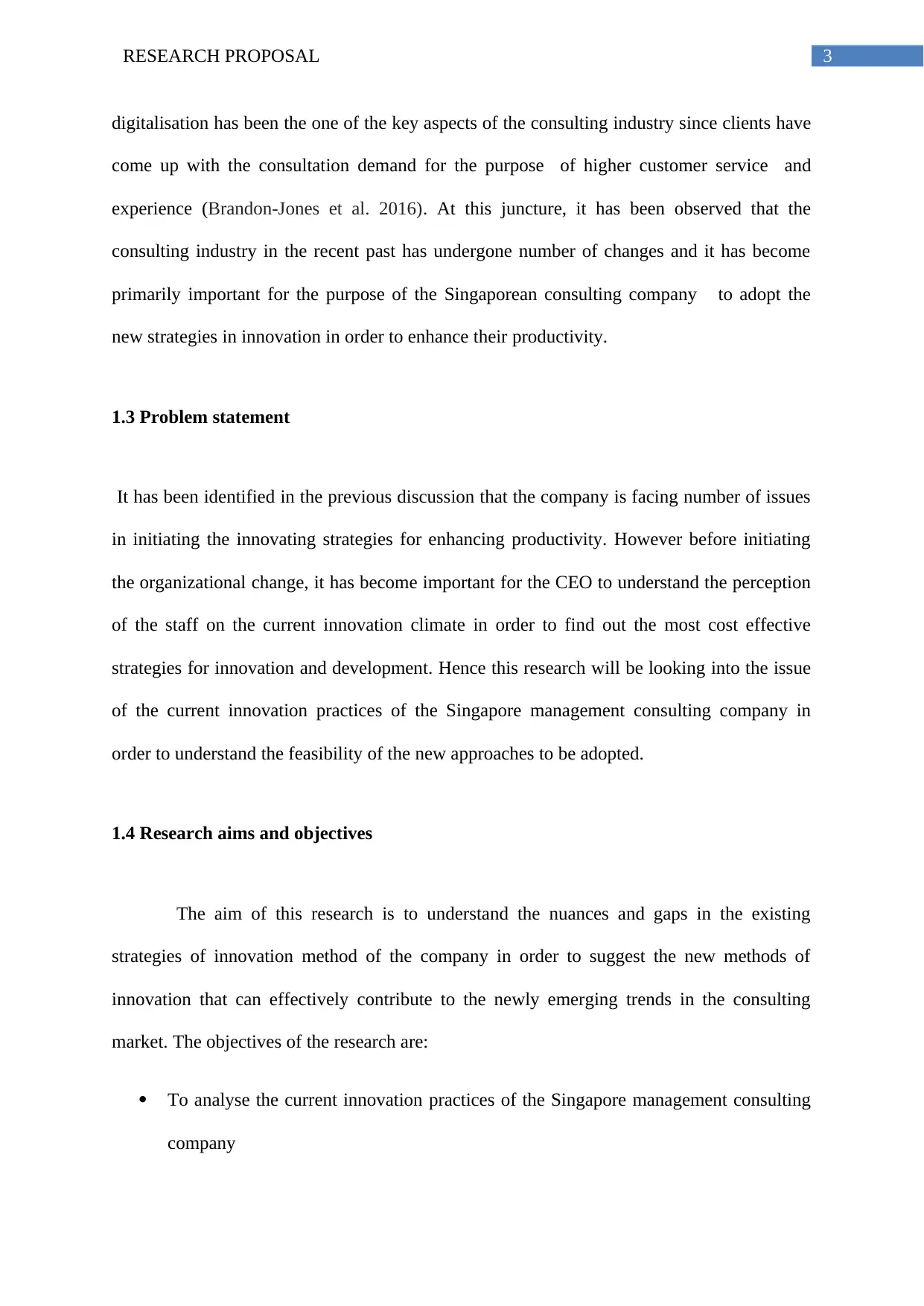
3RESEARCH PROPOSAL
digitalisation has been the one of the key aspects of the consulting industry since clients have
come up with the consultation demand for the purpose of higher customer service and
experience (Brandon-Jones et al. 2016). At this juncture, it has been observed that the
consulting industry in the recent past has undergone number of changes and it has become
primarily important for the purpose of the Singaporean consulting company to adopt the
new strategies in innovation in order to enhance their productivity.
1.3 Problem statement
It has been identified in the previous discussion that the company is facing number of issues
in initiating the innovating strategies for enhancing productivity. However before initiating
the organizational change, it has become important for the CEO to understand the perception
of the staff on the current innovation climate in order to find out the most cost effective
strategies for innovation and development. Hence this research will be looking into the issue
of the current innovation practices of the Singapore management consulting company in
order to understand the feasibility of the new approaches to be adopted.
1.4 Research aims and objectives
The aim of this research is to understand the nuances and gaps in the existing
strategies of innovation method of the company in order to suggest the new methods of
innovation that can effectively contribute to the newly emerging trends in the consulting
market. The objectives of the research are:
To analyse the current innovation practices of the Singapore management consulting
company
digitalisation has been the one of the key aspects of the consulting industry since clients have
come up with the consultation demand for the purpose of higher customer service and
experience (Brandon-Jones et al. 2016). At this juncture, it has been observed that the
consulting industry in the recent past has undergone number of changes and it has become
primarily important for the purpose of the Singaporean consulting company to adopt the
new strategies in innovation in order to enhance their productivity.
1.3 Problem statement
It has been identified in the previous discussion that the company is facing number of issues
in initiating the innovating strategies for enhancing productivity. However before initiating
the organizational change, it has become important for the CEO to understand the perception
of the staff on the current innovation climate in order to find out the most cost effective
strategies for innovation and development. Hence this research will be looking into the issue
of the current innovation practices of the Singapore management consulting company in
order to understand the feasibility of the new approaches to be adopted.
1.4 Research aims and objectives
The aim of this research is to understand the nuances and gaps in the existing
strategies of innovation method of the company in order to suggest the new methods of
innovation that can effectively contribute to the newly emerging trends in the consulting
market. The objectives of the research are:
To analyse the current innovation practices of the Singapore management consulting
company
Paraphrase This Document
Need a fresh take? Get an instant paraphrase of this document with our AI Paraphraser
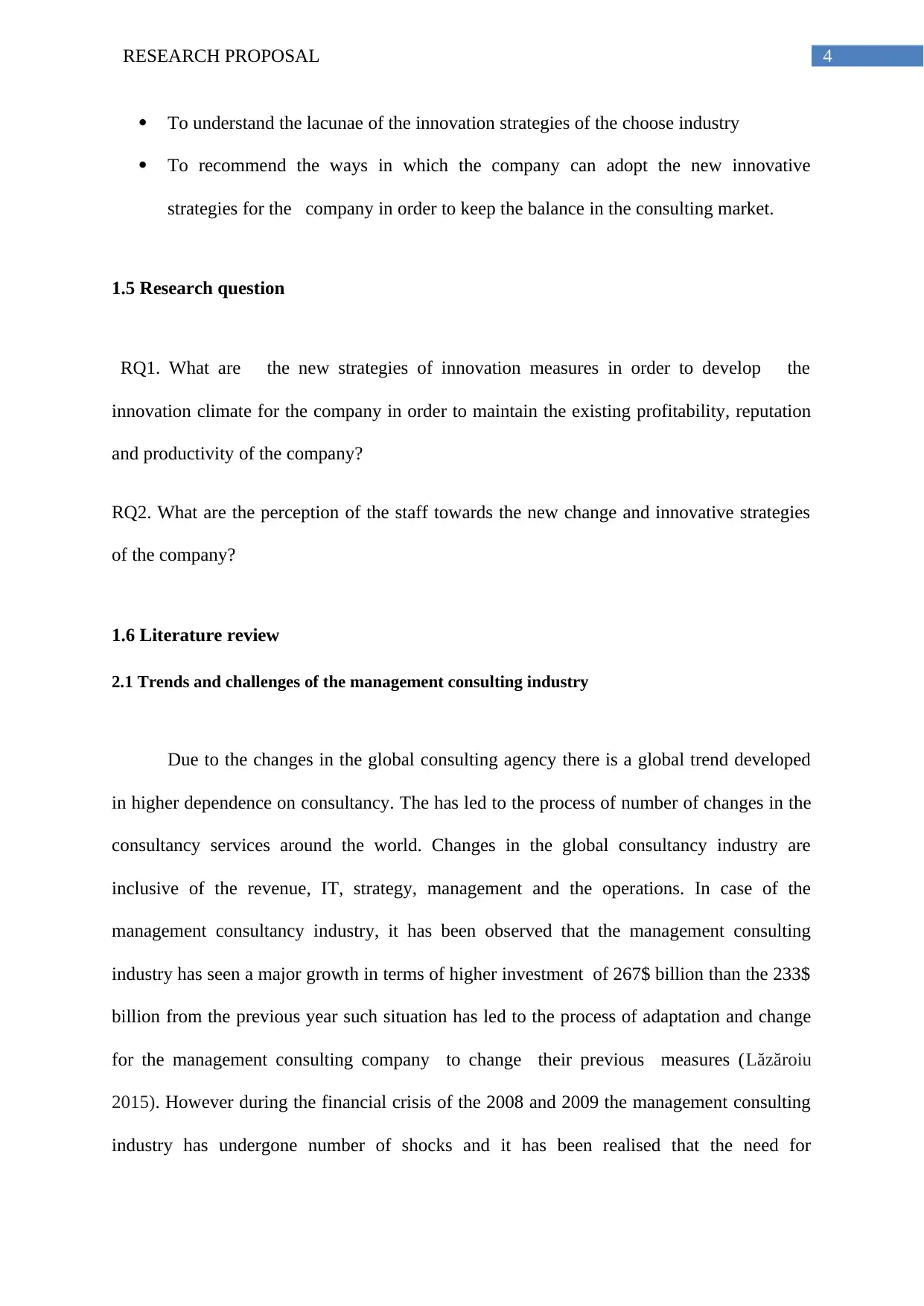
4RESEARCH PROPOSAL
To understand the lacunae of the innovation strategies of the choose industry
To recommend the ways in which the company can adopt the new innovative
strategies for the company in order to keep the balance in the consulting market.
1.5 Research question
RQ1. What are the new strategies of innovation measures in order to develop the
innovation climate for the company in order to maintain the existing profitability, reputation
and productivity of the company?
RQ2. What are the perception of the staff towards the new change and innovative strategies
of the company?
1.6 Literature review
2.1 Trends and challenges of the management consulting industry
Due to the changes in the global consulting agency there is a global trend developed
in higher dependence on consultancy. The has led to the process of number of changes in the
consultancy services around the world. Changes in the global consultancy industry are
inclusive of the revenue, IT, strategy, management and the operations. In case of the
management consultancy industry, it has been observed that the management consulting
industry has seen a major growth in terms of higher investment of 267$ billion than the 233$
billion from the previous year such situation has led to the process of adaptation and change
for the management consulting company to change their previous measures (Lăzăroiu
2015). However during the financial crisis of the 2008 and 2009 the management consulting
industry has undergone number of shocks and it has been realised that the need for
To understand the lacunae of the innovation strategies of the choose industry
To recommend the ways in which the company can adopt the new innovative
strategies for the company in order to keep the balance in the consulting market.
1.5 Research question
RQ1. What are the new strategies of innovation measures in order to develop the
innovation climate for the company in order to maintain the existing profitability, reputation
and productivity of the company?
RQ2. What are the perception of the staff towards the new change and innovative strategies
of the company?
1.6 Literature review
2.1 Trends and challenges of the management consulting industry
Due to the changes in the global consulting agency there is a global trend developed
in higher dependence on consultancy. The has led to the process of number of changes in the
consultancy services around the world. Changes in the global consultancy industry are
inclusive of the revenue, IT, strategy, management and the operations. In case of the
management consultancy industry, it has been observed that the management consulting
industry has seen a major growth in terms of higher investment of 267$ billion than the 233$
billion from the previous year such situation has led to the process of adaptation and change
for the management consulting company to change their previous measures (Lăzăroiu
2015). However during the financial crisis of the 2008 and 2009 the management consulting
industry has undergone number of shocks and it has been realised that the need for
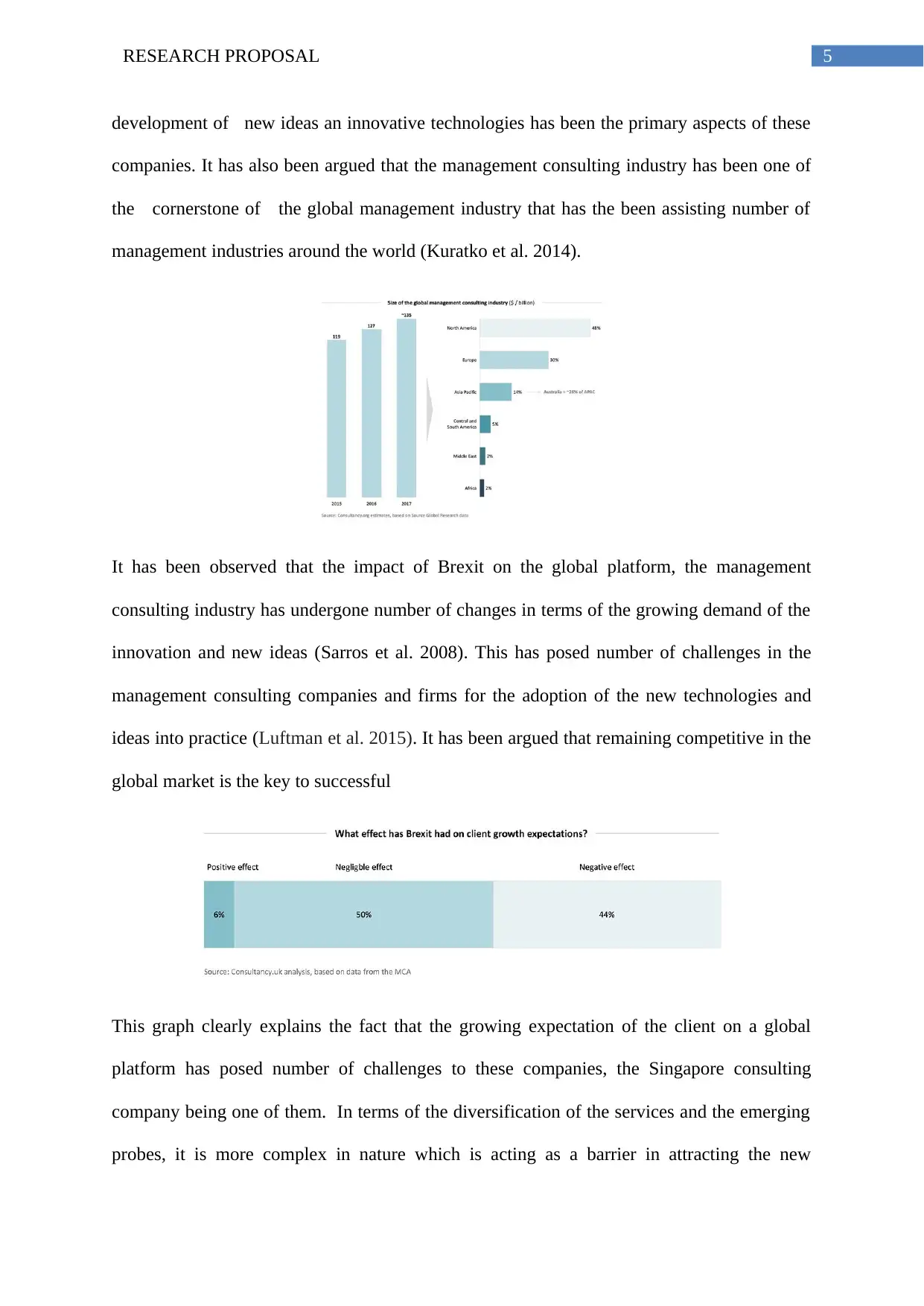
5RESEARCH PROPOSAL
development of new ideas an innovative technologies has been the primary aspects of these
companies. It has also been argued that the management consulting industry has been one of
the cornerstone of the global management industry that has the been assisting number of
management industries around the world (Kuratko et al. 2014).
It has been observed that the impact of Brexit on the global platform, the management
consulting industry has undergone number of changes in terms of the growing demand of the
innovation and new ideas (Sarros et al. 2008). This has posed number of challenges in the
management consulting companies and firms for the adoption of the new technologies and
ideas into practice (Luftman et al. 2015). It has been argued that remaining competitive in the
global market is the key to successful
This graph clearly explains the fact that the growing expectation of the client on a global
platform has posed number of challenges to these companies, the Singapore consulting
company being one of them. In terms of the diversification of the services and the emerging
probes, it is more complex in nature which is acting as a barrier in attracting the new
development of new ideas an innovative technologies has been the primary aspects of these
companies. It has also been argued that the management consulting industry has been one of
the cornerstone of the global management industry that has the been assisting number of
management industries around the world (Kuratko et al. 2014).
It has been observed that the impact of Brexit on the global platform, the management
consulting industry has undergone number of changes in terms of the growing demand of the
innovation and new ideas (Sarros et al. 2008). This has posed number of challenges in the
management consulting companies and firms for the adoption of the new technologies and
ideas into practice (Luftman et al. 2015). It has been argued that remaining competitive in the
global market is the key to successful
This graph clearly explains the fact that the growing expectation of the client on a global
platform has posed number of challenges to these companies, the Singapore consulting
company being one of them. In terms of the diversification of the services and the emerging
probes, it is more complex in nature which is acting as a barrier in attracting the new
⊘ This is a preview!⊘
Do you want full access?
Subscribe today to unlock all pages.

Trusted by 1+ million students worldwide
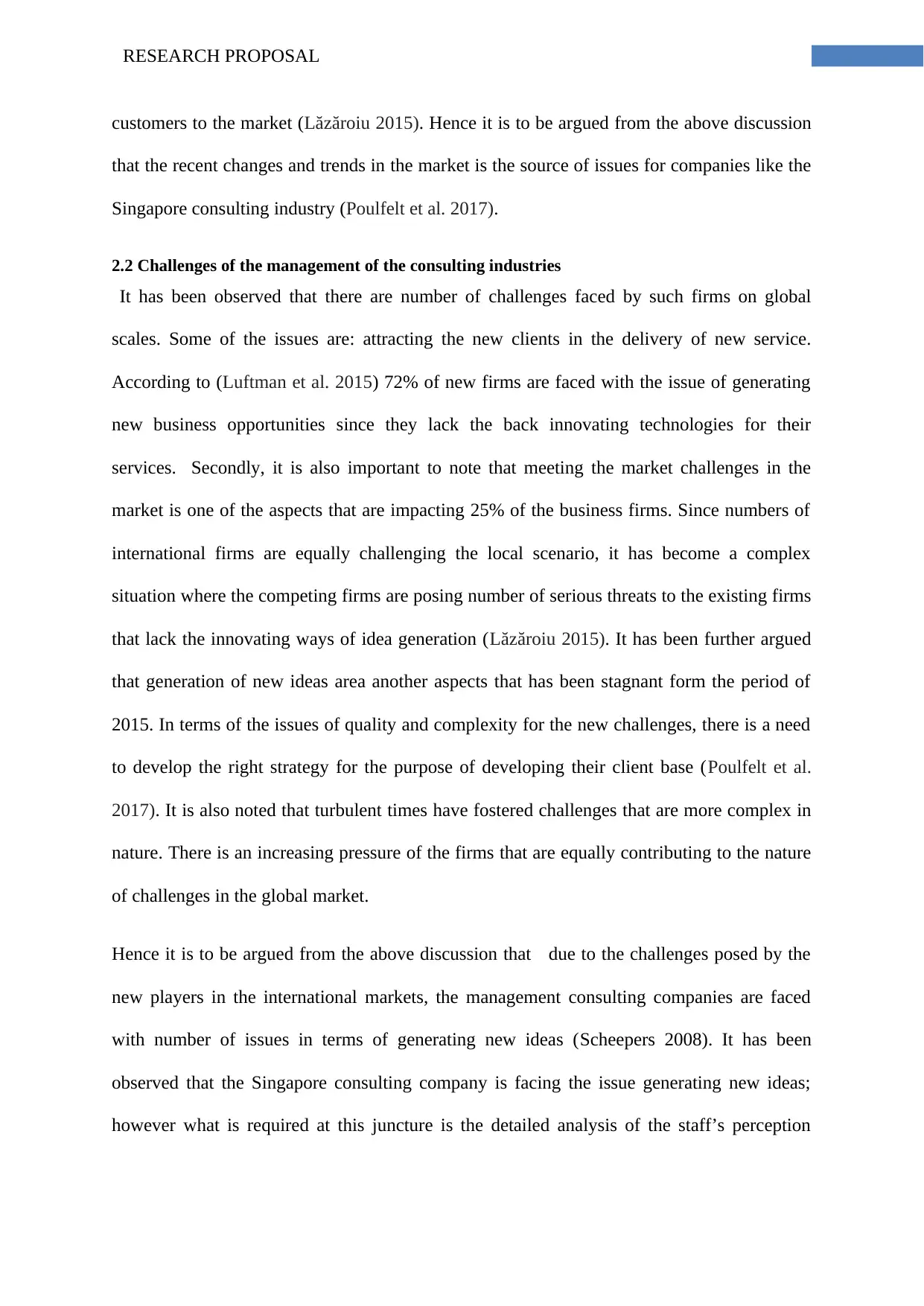
6RESEARCH PROPOSAL
customers to the market (Lăzăroiu 2015). Hence it is to be argued from the above discussion
that the recent changes and trends in the market is the source of issues for companies like the
Singapore consulting industry (Poulfelt et al. 2017).
2.2 Challenges of the management of the consulting industries
It has been observed that there are number of challenges faced by such firms on global
scales. Some of the issues are: attracting the new clients in the delivery of new service.
According to (Luftman et al. 2015) 72% of new firms are faced with the issue of generating
new business opportunities since they lack the back innovating technologies for their
services. Secondly, it is also important to note that meeting the market challenges in the
market is one of the aspects that are impacting 25% of the business firms. Since numbers of
international firms are equally challenging the local scenario, it has become a complex
situation where the competing firms are posing number of serious threats to the existing firms
that lack the innovating ways of idea generation (Lăzăroiu 2015). It has been further argued
that generation of new ideas area another aspects that has been stagnant form the period of
2015. In terms of the issues of quality and complexity for the new challenges, there is a need
to develop the right strategy for the purpose of developing their client base (Poulfelt et al.
2017). It is also noted that turbulent times have fostered challenges that are more complex in
nature. There is an increasing pressure of the firms that are equally contributing to the nature
of challenges in the global market.
Hence it is to be argued from the above discussion that due to the challenges posed by the
new players in the international markets, the management consulting companies are faced
with number of issues in terms of generating new ideas (Scheepers 2008). It has been
observed that the Singapore consulting company is facing the issue generating new ideas;
however what is required at this juncture is the detailed analysis of the staff’s perception
customers to the market (Lăzăroiu 2015). Hence it is to be argued from the above discussion
that the recent changes and trends in the market is the source of issues for companies like the
Singapore consulting industry (Poulfelt et al. 2017).
2.2 Challenges of the management of the consulting industries
It has been observed that there are number of challenges faced by such firms on global
scales. Some of the issues are: attracting the new clients in the delivery of new service.
According to (Luftman et al. 2015) 72% of new firms are faced with the issue of generating
new business opportunities since they lack the back innovating technologies for their
services. Secondly, it is also important to note that meeting the market challenges in the
market is one of the aspects that are impacting 25% of the business firms. Since numbers of
international firms are equally challenging the local scenario, it has become a complex
situation where the competing firms are posing number of serious threats to the existing firms
that lack the innovating ways of idea generation (Lăzăroiu 2015). It has been further argued
that generation of new ideas area another aspects that has been stagnant form the period of
2015. In terms of the issues of quality and complexity for the new challenges, there is a need
to develop the right strategy for the purpose of developing their client base (Poulfelt et al.
2017). It is also noted that turbulent times have fostered challenges that are more complex in
nature. There is an increasing pressure of the firms that are equally contributing to the nature
of challenges in the global market.
Hence it is to be argued from the above discussion that due to the challenges posed by the
new players in the international markets, the management consulting companies are faced
with number of issues in terms of generating new ideas (Scheepers 2008). It has been
observed that the Singapore consulting company is facing the issue generating new ideas;
however what is required at this juncture is the detailed analysis of the staff’s perception
Paraphrase This Document
Need a fresh take? Get an instant paraphrase of this document with our AI Paraphraser
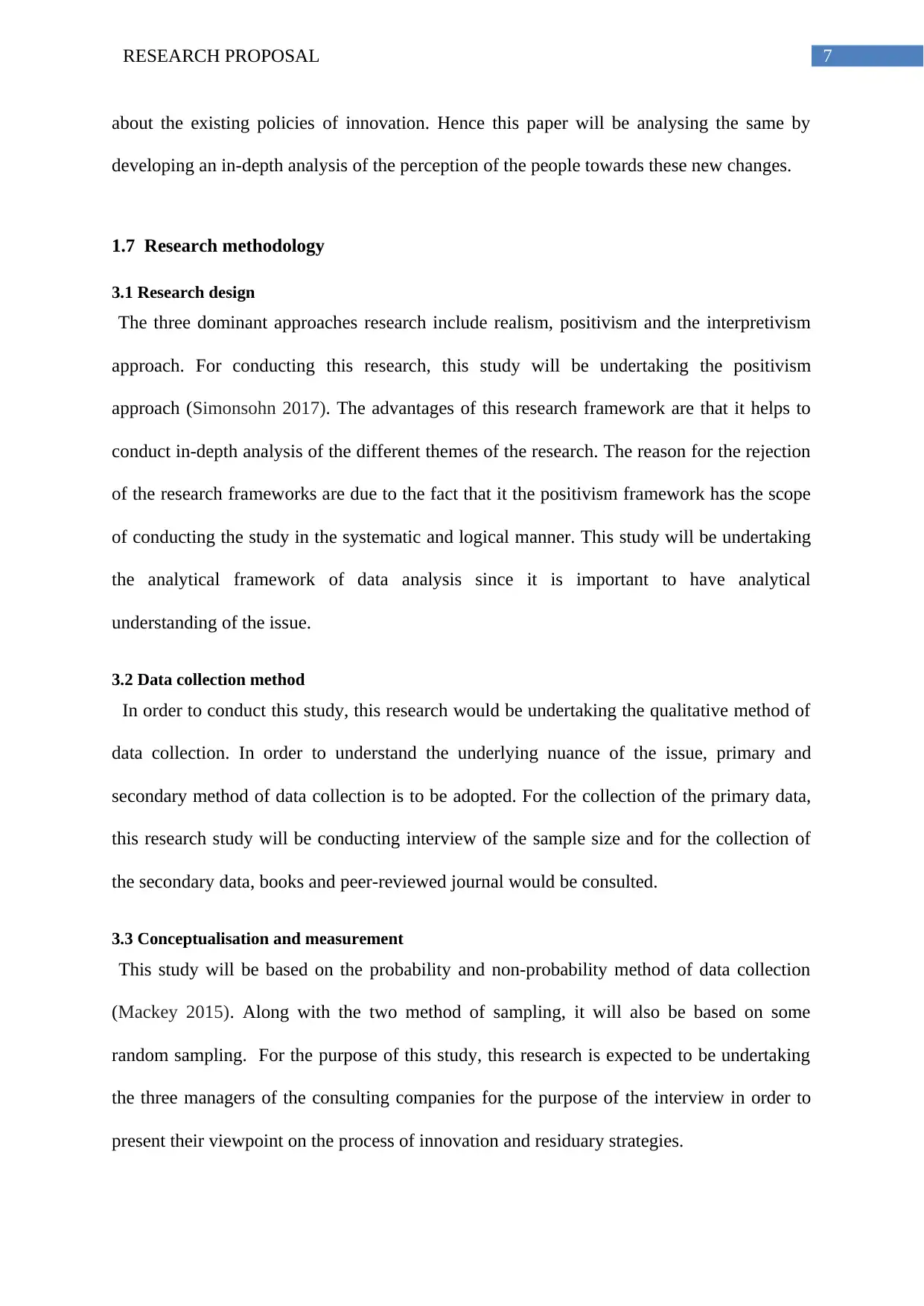
7RESEARCH PROPOSAL
about the existing policies of innovation. Hence this paper will be analysing the same by
developing an in-depth analysis of the perception of the people towards these new changes.
1.7 Research methodology
3.1 Research design
The three dominant approaches research include realism, positivism and the interpretivism
approach. For conducting this research, this study will be undertaking the positivism
approach (Simonsohn 2017). The advantages of this research framework are that it helps to
conduct in-depth analysis of the different themes of the research. The reason for the rejection
of the research frameworks are due to the fact that it the positivism framework has the scope
of conducting the study in the systematic and logical manner. This study will be undertaking
the analytical framework of data analysis since it is important to have analytical
understanding of the issue.
3.2 Data collection method
In order to conduct this study, this research would be undertaking the qualitative method of
data collection. In order to understand the underlying nuance of the issue, primary and
secondary method of data collection is to be adopted. For the collection of the primary data,
this research study will be conducting interview of the sample size and for the collection of
the secondary data, books and peer-reviewed journal would be consulted.
3.3 Conceptualisation and measurement
This study will be based on the probability and non-probability method of data collection
(Mackey 2015). Along with the two method of sampling, it will also be based on some
random sampling. For the purpose of this study, this research is expected to be undertaking
the three managers of the consulting companies for the purpose of the interview in order to
present their viewpoint on the process of innovation and residuary strategies.
about the existing policies of innovation. Hence this paper will be analysing the same by
developing an in-depth analysis of the perception of the people towards these new changes.
1.7 Research methodology
3.1 Research design
The three dominant approaches research include realism, positivism and the interpretivism
approach. For conducting this research, this study will be undertaking the positivism
approach (Simonsohn 2017). The advantages of this research framework are that it helps to
conduct in-depth analysis of the different themes of the research. The reason for the rejection
of the research frameworks are due to the fact that it the positivism framework has the scope
of conducting the study in the systematic and logical manner. This study will be undertaking
the analytical framework of data analysis since it is important to have analytical
understanding of the issue.
3.2 Data collection method
In order to conduct this study, this research would be undertaking the qualitative method of
data collection. In order to understand the underlying nuance of the issue, primary and
secondary method of data collection is to be adopted. For the collection of the primary data,
this research study will be conducting interview of the sample size and for the collection of
the secondary data, books and peer-reviewed journal would be consulted.
3.3 Conceptualisation and measurement
This study will be based on the probability and non-probability method of data collection
(Mackey 2015). Along with the two method of sampling, it will also be based on some
random sampling. For the purpose of this study, this research is expected to be undertaking
the three managers of the consulting companies for the purpose of the interview in order to
present their viewpoint on the process of innovation and residuary strategies.
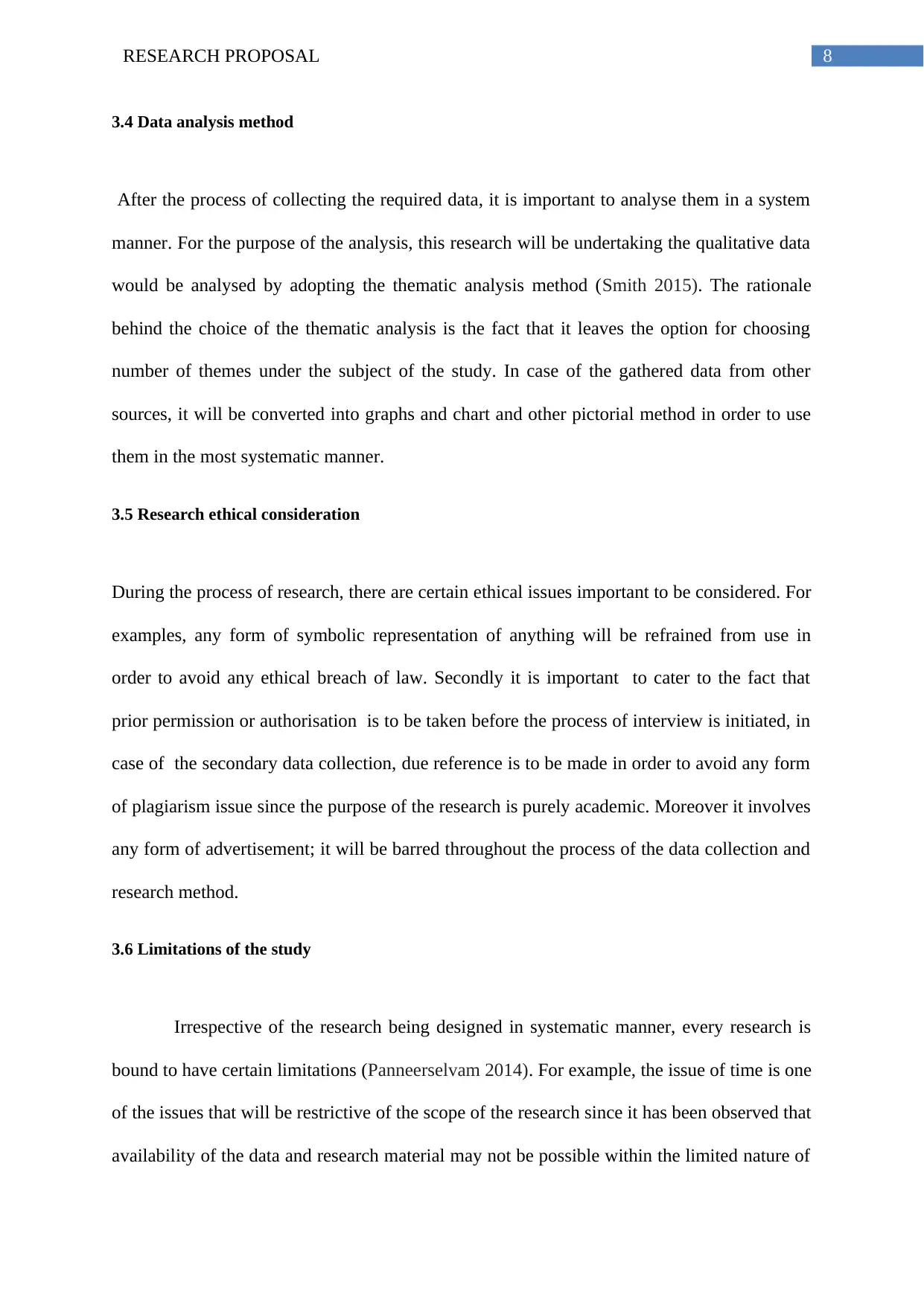
8RESEARCH PROPOSAL
3.4 Data analysis method
After the process of collecting the required data, it is important to analyse them in a system
manner. For the purpose of the analysis, this research will be undertaking the qualitative data
would be analysed by adopting the thematic analysis method (Smith 2015). The rationale
behind the choice of the thematic analysis is the fact that it leaves the option for choosing
number of themes under the subject of the study. In case of the gathered data from other
sources, it will be converted into graphs and chart and other pictorial method in order to use
them in the most systematic manner.
3.5 Research ethical consideration
During the process of research, there are certain ethical issues important to be considered. For
examples, any form of symbolic representation of anything will be refrained from use in
order to avoid any ethical breach of law. Secondly it is important to cater to the fact that
prior permission or authorisation is to be taken before the process of interview is initiated, in
case of the secondary data collection, due reference is to be made in order to avoid any form
of plagiarism issue since the purpose of the research is purely academic. Moreover it involves
any form of advertisement; it will be barred throughout the process of the data collection and
research method.
3.6 Limitations of the study
Irrespective of the research being designed in systematic manner, every research is
bound to have certain limitations (Panneerselvam 2014). For example, the issue of time is one
of the issues that will be restrictive of the scope of the research since it has been observed that
availability of the data and research material may not be possible within the limited nature of
3.4 Data analysis method
After the process of collecting the required data, it is important to analyse them in a system
manner. For the purpose of the analysis, this research will be undertaking the qualitative data
would be analysed by adopting the thematic analysis method (Smith 2015). The rationale
behind the choice of the thematic analysis is the fact that it leaves the option for choosing
number of themes under the subject of the study. In case of the gathered data from other
sources, it will be converted into graphs and chart and other pictorial method in order to use
them in the most systematic manner.
3.5 Research ethical consideration
During the process of research, there are certain ethical issues important to be considered. For
examples, any form of symbolic representation of anything will be refrained from use in
order to avoid any ethical breach of law. Secondly it is important to cater to the fact that
prior permission or authorisation is to be taken before the process of interview is initiated, in
case of the secondary data collection, due reference is to be made in order to avoid any form
of plagiarism issue since the purpose of the research is purely academic. Moreover it involves
any form of advertisement; it will be barred throughout the process of the data collection and
research method.
3.6 Limitations of the study
Irrespective of the research being designed in systematic manner, every research is
bound to have certain limitations (Panneerselvam 2014). For example, the issue of time is one
of the issues that will be restrictive of the scope of the research since it has been observed that
availability of the data and research material may not be possible within the limited nature of
⊘ This is a preview!⊘
Do you want full access?
Subscribe today to unlock all pages.

Trusted by 1+ million students worldwide
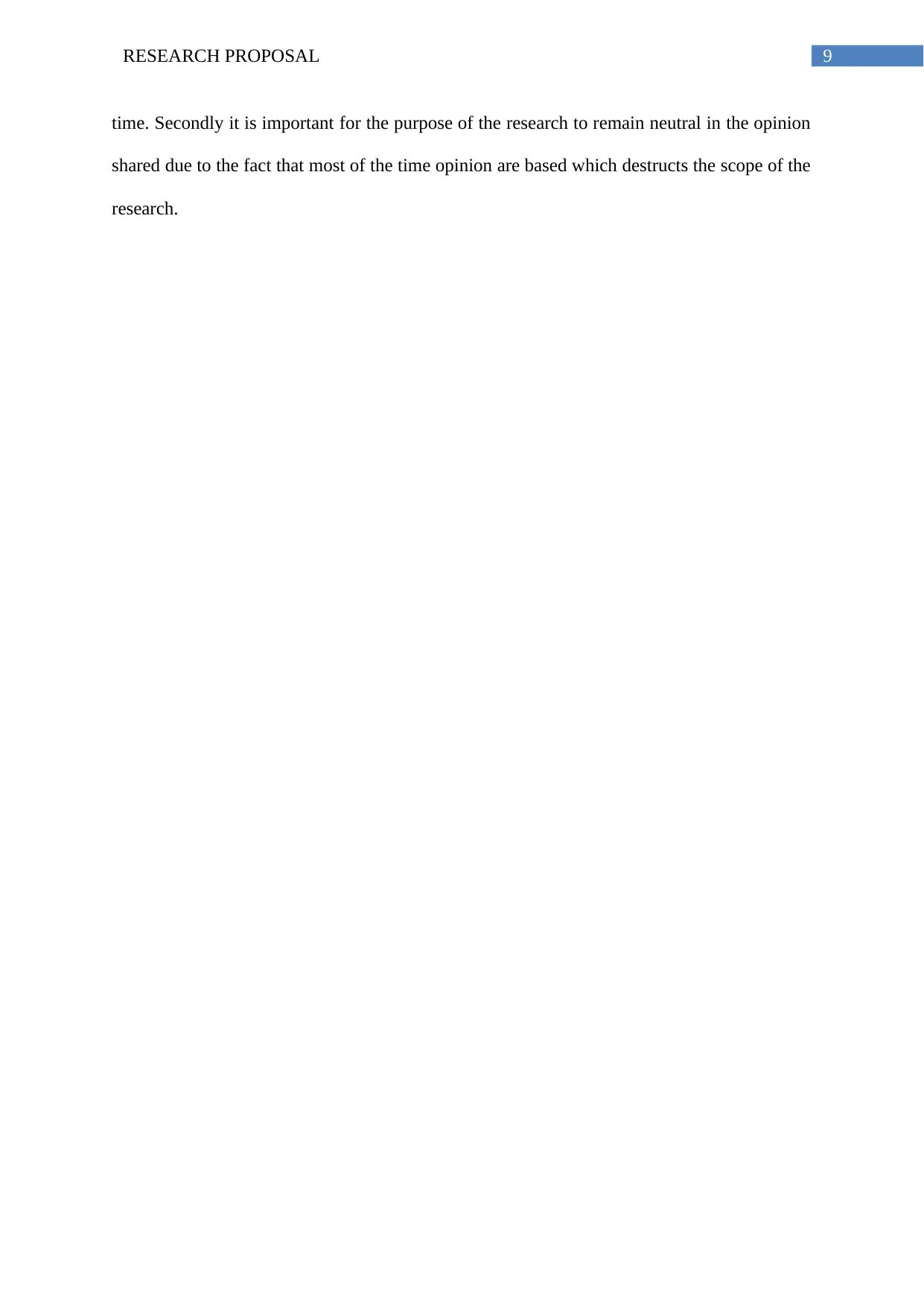
9RESEARCH PROPOSAL
time. Secondly it is important for the purpose of the research to remain neutral in the opinion
shared due to the fact that most of the time opinion are based which destructs the scope of the
research.
time. Secondly it is important for the purpose of the research to remain neutral in the opinion
shared due to the fact that most of the time opinion are based which destructs the scope of the
research.
Paraphrase This Document
Need a fresh take? Get an instant paraphrase of this document with our AI Paraphraser
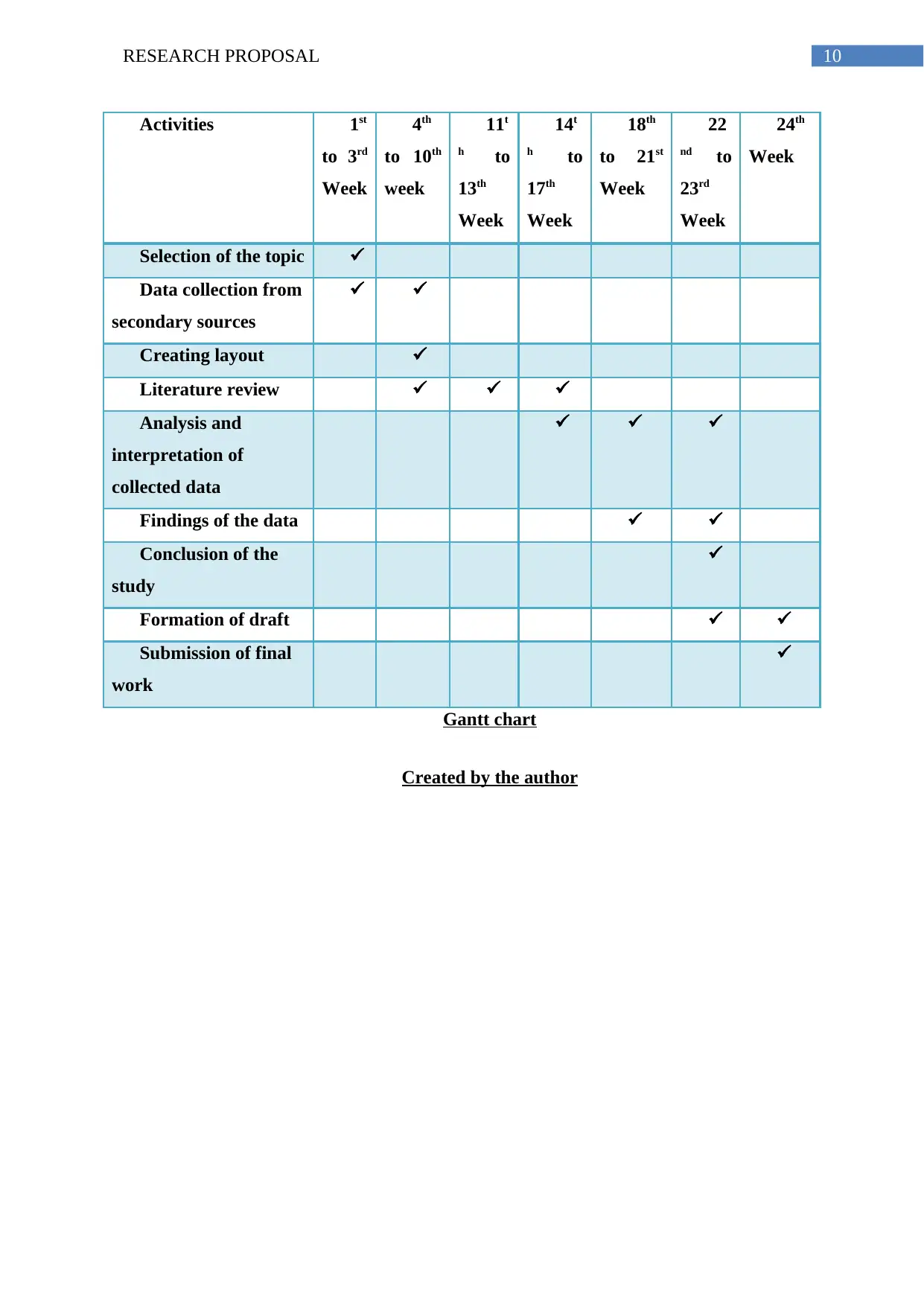
10RESEARCH PROPOSAL
Activities 1st
to 3rd
Week
4th
to 10th
week
11t
h to
13th
Week
14t
h to
17th
Week
18th
to 21st
Week
22
nd to
23rd
Week
24th
Week
Selection of the topic
Data collection from
secondary sources
Creating layout
Literature review
Analysis and
interpretation of
collected data
Findings of the data
Conclusion of the
study
Formation of draft
Submission of final
work
Gantt chart
Created by the author
Activities 1st
to 3rd
Week
4th
to 10th
week
11t
h to
13th
Week
14t
h to
17th
Week
18th
to 21st
Week
22
nd to
23rd
Week
24th
Week
Selection of the topic
Data collection from
secondary sources
Creating layout
Literature review
Analysis and
interpretation of
collected data
Findings of the data
Conclusion of the
study
Formation of draft
Submission of final
work
Gantt chart
Created by the author
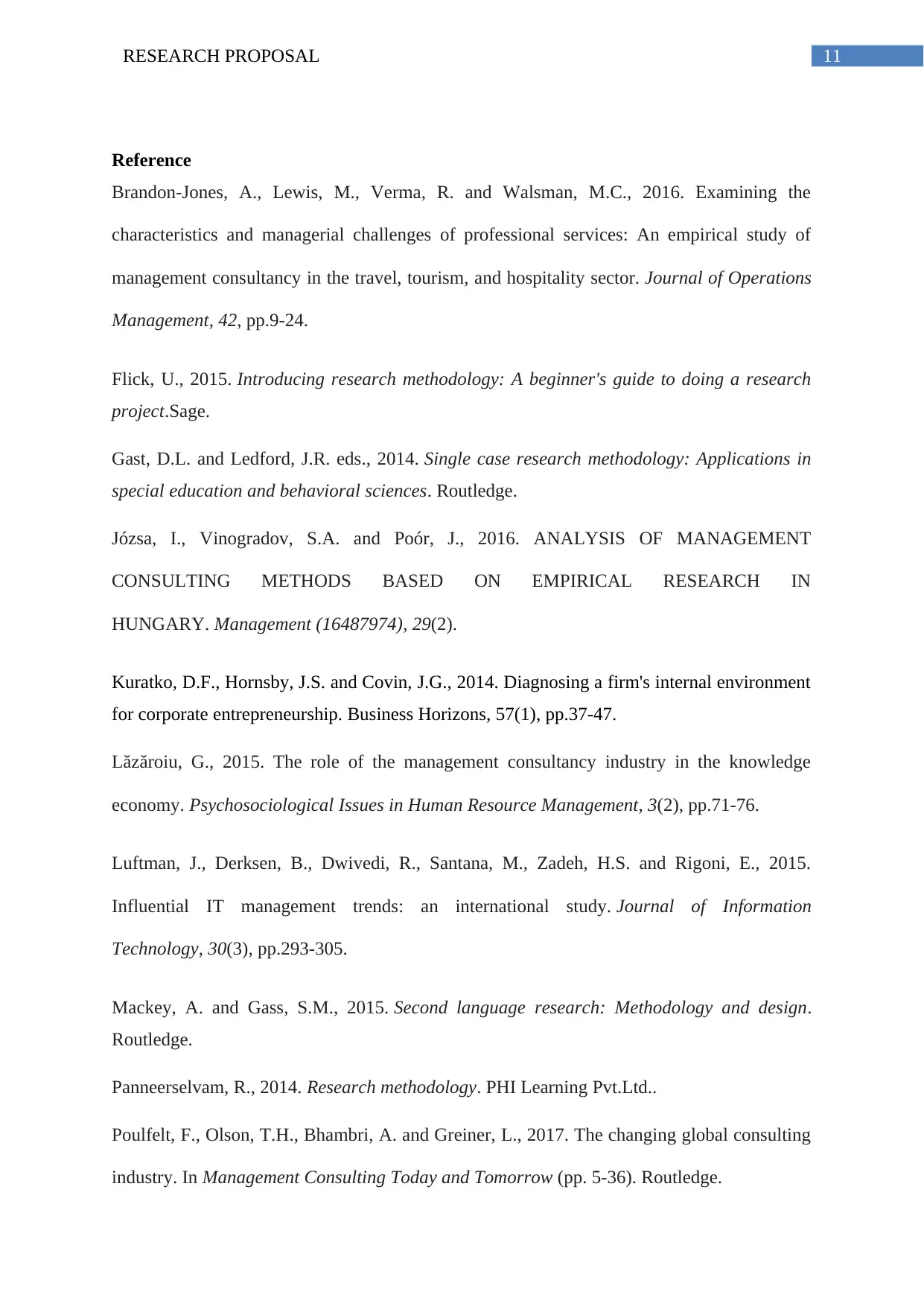
11RESEARCH PROPOSAL
Reference
Brandon-Jones, A., Lewis, M., Verma, R. and Walsman, M.C., 2016. Examining the
characteristics and managerial challenges of professional services: An empirical study of
management consultancy in the travel, tourism, and hospitality sector. Journal of Operations
Management, 42, pp.9-24.
Flick, U., 2015. Introducing research methodology: A beginner's guide to doing a research
project.Sage.
Gast, D.L. and Ledford, J.R. eds., 2014. Single case research methodology: Applications in
special education and behavioral sciences. Routledge.
Józsa, I., Vinogradov, S.A. and Poór, J., 2016. ANALYSIS OF MANAGEMENT
CONSULTING METHODS BASED ON EMPIRICAL RESEARCH IN
HUNGARY. Management (16487974), 29(2).
Kuratko, D.F., Hornsby, J.S. and Covin, J.G., 2014. Diagnosing a firm's internal environment
for corporate entrepreneurship. Business Horizons, 57(1), pp.37-47.
Lăzăroiu, G., 2015. The role of the management consultancy industry in the knowledge
economy. Psychosociological Issues in Human Resource Management, 3(2), pp.71-76.
Luftman, J., Derksen, B., Dwivedi, R., Santana, M., Zadeh, H.S. and Rigoni, E., 2015.
Influential IT management trends: an international study. Journal of Information
Technology, 30(3), pp.293-305.
Mackey, A. and Gass, S.M., 2015. Second language research: Methodology and design.
Routledge.
Panneerselvam, R., 2014. Research methodology. PHI Learning Pvt.Ltd..
Poulfelt, F., Olson, T.H., Bhambri, A. and Greiner, L., 2017. The changing global consulting
industry. In Management Consulting Today and Tomorrow (pp. 5-36). Routledge.
Reference
Brandon-Jones, A., Lewis, M., Verma, R. and Walsman, M.C., 2016. Examining the
characteristics and managerial challenges of professional services: An empirical study of
management consultancy in the travel, tourism, and hospitality sector. Journal of Operations
Management, 42, pp.9-24.
Flick, U., 2015. Introducing research methodology: A beginner's guide to doing a research
project.Sage.
Gast, D.L. and Ledford, J.R. eds., 2014. Single case research methodology: Applications in
special education and behavioral sciences. Routledge.
Józsa, I., Vinogradov, S.A. and Poór, J., 2016. ANALYSIS OF MANAGEMENT
CONSULTING METHODS BASED ON EMPIRICAL RESEARCH IN
HUNGARY. Management (16487974), 29(2).
Kuratko, D.F., Hornsby, J.S. and Covin, J.G., 2014. Diagnosing a firm's internal environment
for corporate entrepreneurship. Business Horizons, 57(1), pp.37-47.
Lăzăroiu, G., 2015. The role of the management consultancy industry in the knowledge
economy. Psychosociological Issues in Human Resource Management, 3(2), pp.71-76.
Luftman, J., Derksen, B., Dwivedi, R., Santana, M., Zadeh, H.S. and Rigoni, E., 2015.
Influential IT management trends: an international study. Journal of Information
Technology, 30(3), pp.293-305.
Mackey, A. and Gass, S.M., 2015. Second language research: Methodology and design.
Routledge.
Panneerselvam, R., 2014. Research methodology. PHI Learning Pvt.Ltd..
Poulfelt, F., Olson, T.H., Bhambri, A. and Greiner, L., 2017. The changing global consulting
industry. In Management Consulting Today and Tomorrow (pp. 5-36). Routledge.
⊘ This is a preview!⊘
Do you want full access?
Subscribe today to unlock all pages.

Trusted by 1+ million students worldwide
1 out of 13
Related Documents
Your All-in-One AI-Powered Toolkit for Academic Success.
+13062052269
info@desklib.com
Available 24*7 on WhatsApp / Email
![[object Object]](/_next/static/media/star-bottom.7253800d.svg)
Unlock your academic potential
Copyright © 2020–2025 A2Z Services. All Rights Reserved. Developed and managed by ZUCOL.





